Local: FEUP, Auditorium Prof. Dr. José Marques Dos Santos
Date: Tuesday, July 1st, 2025 | 14h20-15h40
Chair: Liliana Antão, PhD Student (PRODEI), FEUP

Liliana Antão
PhD Student (PRODEI), FEUP
Liliana Antão holds a master’s in electrical and computer engineering. She is currently a PhD student at PRODEI, and researcher for Digital and Intelligent Industry (DIGI2) lab. She is one of the co-founders of Medtiles, a startup leading AI-driven solutions in healthcare. Previously, she worked as a Senior Data Scientist at DEUS and a Senior Consultant at Deloitte. Liliana has published research in industrial IoT and AI applications and has delivered over 10 AI-related talks.
Goals: Business Ideas Acceleration Programmes are designed to support PhD students eager to turn their innovative research into a viable, market-ready business. Academia is full of ground-breaking discoveries, but the real challenge often lies in transforming those discoveries into something that can make an impact outside of the lab. These acceleration programs bridge that gap by providing mentorship, resources, and structured support to help you commercialize your research, launch a startup, or explore the entrepreneurial landscape. Whether your goal is to bring a product to market or develop a service based on your research, these programs equip you with the tools to turn your academic passion into a thriving business.
Rules: A group of PhD students will deliver a five-minute pitch, presenting an innovative research proposal. The pitch should introduce the research-based product, process, or service, explain its innovation, and outline the execution plan. All this must be effectively communicated within the five-minute timeframe.
Eligibility: Teams must consist of 1-3 PhD students enrolled in FEUP Doctoral Programmes
Date: Please submit your application via the following link by May 30th. Up to seven 5-minute pitches will be selected for presentation at DCE25.
Evaluation: The jury is composed of experts from both academia and society:
- Wilson Caldeira, Invited Professor, FEUP
- Carrie Baptist, Chief Strategy Officer, Conception X
- Raphael Stanzani, Entrepreneurship Programs Manager, UPTEC
- Bruno Azevedo, CEO, AddVolt
- Júlio Martins, CEO, Everythink
Award: One or two elements of the winning team will receive financial support from their respective doctoral program to:
-
Attend the DEMO Day of the 2025 edition of the Conception X Programme in London, UK (November 2025);
-
Receive in-house mentorship and coaching to prepare the application to be submitted to the 2026 edition of the Conception X;
-
Participate in the School of Startups at UPTEC, a specialized program for researchers.

Program
14h20-14h30 | What is Conception X?
Conception X empowers PhD students to become Venture Scientists – PhD founders who bridge the gap between academia and industry. Whether you’re already working on a startup or interested in learning how to translate and commercialize your research, our program supports accelerating your understanding of entrepreneurship.
Lecturer: Carrie Baptist, Chief Strategy Officer, Conception X

Carrie Baptist
Chief Strategy Officer, Conception X
Carrie is Chief Strategy Officer of Conception X, Europe’s largest PhD deeptech venture programme. Conception X works with PhD scientists from 65+ Universities across Europe, providing a large cross-University platform for PhD founders, unlocking innovations from the lab and accelerating early stage research commercialisation.
14h30-14h35 | A Success Case: FTNanoAD-Targeted-Nanocarriers for Brain Diseases
BNanoTech, Inc. was founded on 02/03/2025 by Joana Loureiro and Maria do Carmo Pereira. The company’s technology originated from research conducted at the Laboratory for Process Engineering, Environment, Biotechnology and Energy (LEPABE), thus reinforcing the company’s strong connection with FEUP. The company develops controlled release systems for transporting drugs to the brain. The target market of BNanoTech, Ltd. includes pharmaceutical and biomedical industries interested in advanced therapies for neurodegenerative diseases, with potential for strategic partnerships and commercialization at national and international levels. Our participation in the Conception X program resulted directly in XTX Ventures proposing a £100,000 investment in our technology, which led to the faster creation of BNanoTech.
Lecturer: Joana Loureiro, Assistant Professor, LEPABE/ALiCE, FEUP
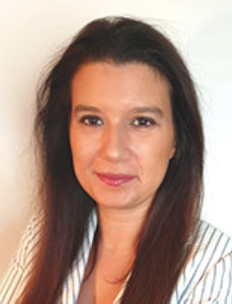
Joana Loureiro
Assistant Professor, LEPABE/ALiCE, FEUP
Joana A. Loureiro is an Assistant Professor at the Faculty of Engineering of the University of Porto (FEUP) and a senior researcher at the Laboratory for Process Engineering, Environment, Biotechnology, and Energy (LEPABE). She earned her Ph.D. in Chemical and Biological Engineering from the University of Porto. Her research focuses on nanotechnology, particularly the development of functionalized nano-drug delivery systems for therapeutic applications, studies on amyloidogenic peptides, and the design of nanoparticles targeting the blood-brain barrier. She is/was involved in several projects (>17) for developing nanoengineered structures for the controlled delivery of bioactive molecules and has been in active collaboration with several national and international research groups. Dr. Loureiro has contributed to numerous scientific publications in these fields and supervised over 25 PhD and Master’s students.
14h35-14h45 | School of Startups at UPTEC
At the School of Startups, UPTEC – Science and Technology Park of the University of Porto offers dedicated programs that support different innovation pathways for entrepreneurs, researchers, students, and corporations. It’s a 3-month business idea acceleration program that provides the boost your idea needs to thrive. With 90+ hours of intensive hands-on training and personalized mentorship from industry experts, this program will help you validate your idea within the market.
Lecturer: Raphael Stanzani, Entrepreneurship Programs Manager, UPTEC
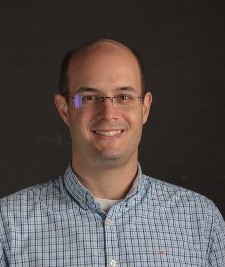
Raphael Stanzani
Entrepreneurship Programs Manager, UPTEC
Raphael, the Entrepreneurship Programs Manager at UPTEC, designs and executes startup acceleration workshops to transform innovative ideas into sustainable businesses that can scale and attract investment. He graduated from UFSCar (Brazil) with an MBA from Quantic School of Business (US). Has experience as Supply Chain Projects Manager at Procter & Gamble in Brazil and Territory Sales Manager for the Oral-B brand at Procter & Gamble Portugal. He also co-founded Connect Robotics, a drone delivery startup that received funding from ESA and EU. The startup was incubated at UPTEC, accelerated by Carnegie Mellon University, and a spin-off from the University of Porto.
14h45-14h55 | A Success Case of a Spin-Off FEUP: AddVolt
AddVolt is a technological company that developed the world’s 1st plug-in electrical system targeted for transportation markets. With our technology, refrigeration trucks can perform their cold operation in electric mode, reducing diesel dependence, the level of noise, and CO2 emissions.
Lecturer: Bruno Azevedo, CEO, AddVolt
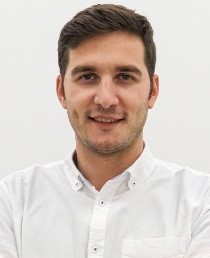
Bruno Azevedo
CEO, AddVolt
Bruno is the CEO and co-founder of AddVolt, the powerhouse that developed the world’s first solution to replace the 4.5 million diesel engines used in refrigerated transport. He and his three co-founders have been dedicated to this innovative project since their university days. During the past ten years, he has also honed his commercial acumen, propelling Addvolt to the forefront of sustainable transport technology. Bruno holds a Master’s in Electrical Engineering from FEUP – University of Porto. He further enhanced his expertise by completing a business and management program at Carnegie Mellon University. In recognition of his achievements, Bruno was honored by Forbes in 2020, being named to the 30 Under 30 list in the Manufacturing & Industry category.
14h55-15h40 | Five-Minute Pitch for PhD Students
Selected Pitches:

Amir Hossein Farzamiyan
PhD Student, Doctoral Program in Telecommunications, FEUP
LogloTrix, Smart Inventory Management
LogIoTrix is a smart inventory management system that uses connected sensors to monitor stock levels automatically. The data is sent to the cloud, where it’s analyzed using AI to predict demand and optimize inventory. This allows businesses to make faster, data-driven decisions, reduce waste, and ensure the right products are always available—without relying on manual tracking.
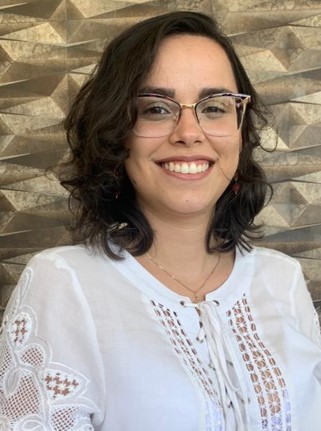
Luiza Sena
PhD Student, Doctoral Program in Environmental Engineering, FEUP
FertiGo – Wastewater in. Fertilizer out.
Compact and automated system for the recovery of nutrients from wastewater. It works by mixing wastewater rich in nutrients with chemicals to produce solid fertilisers. The entire process takes place in a small (< 1 m3) transportable unit that can be moved between plants as needed. This portable unit incorporates patented technology characterised by an efficient mixing mechanism which significantly increases heat and mass transfer in continuous mode. This enables precise control of the physical and chemical properties of the resulting fertiliser.
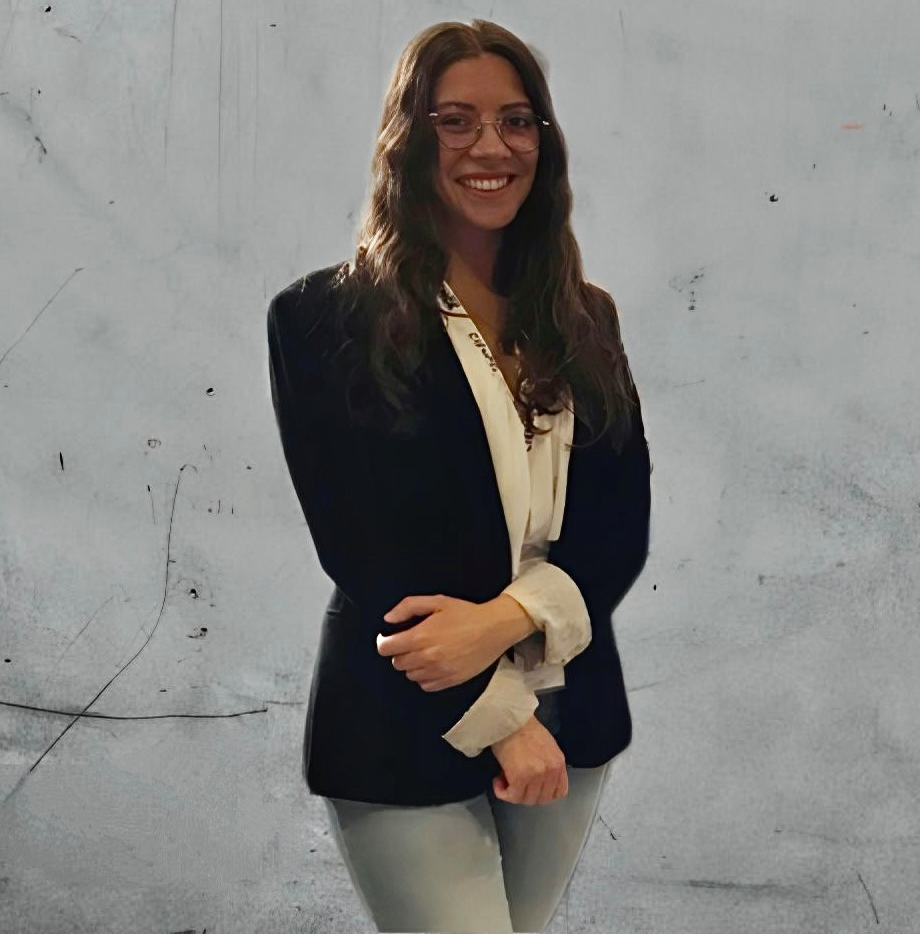
Rita Martins
PhD Student, Doctoral Program in Chemical and Biological Engineering, FEUP
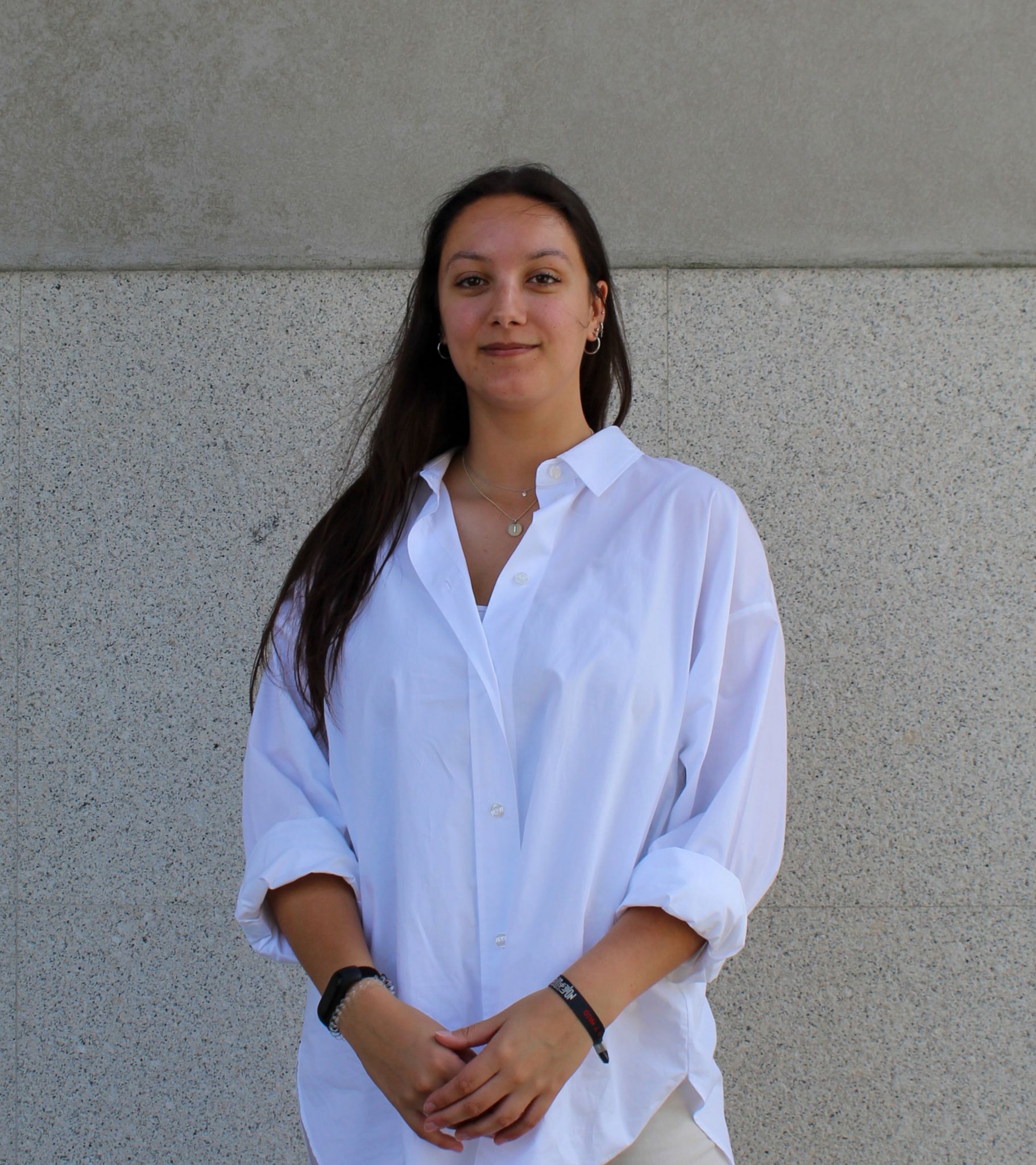
Inês Freitas
PhD Student, Doctoral Program in Chemical and Biological Engineering, FEUP
EcoWires – Plastic-free smart packaging
EcoWires offers a new printing technology for flexible electronic circuits, taking advantage of abundant, affordable and renewable sources, unlike conventional electrical conductors. A conductive ink made of carbon nanoparticles is printed inside the final substrate, a transparent cellulose film, avoiding the need for an extra insulation layer deposition. Using EcoWires technology, we are developing plastic-free smart packages with chipless RFID antennas integrated during the manufacturing process. With EcoWires, businesses can embrace the IoT era sustainably, providing distributors and retailers the dual benefit of a reduced carbon footprint through plastic-free packaging and enhanced profitability by enabling advanced product tracing and improved consumer engagement.
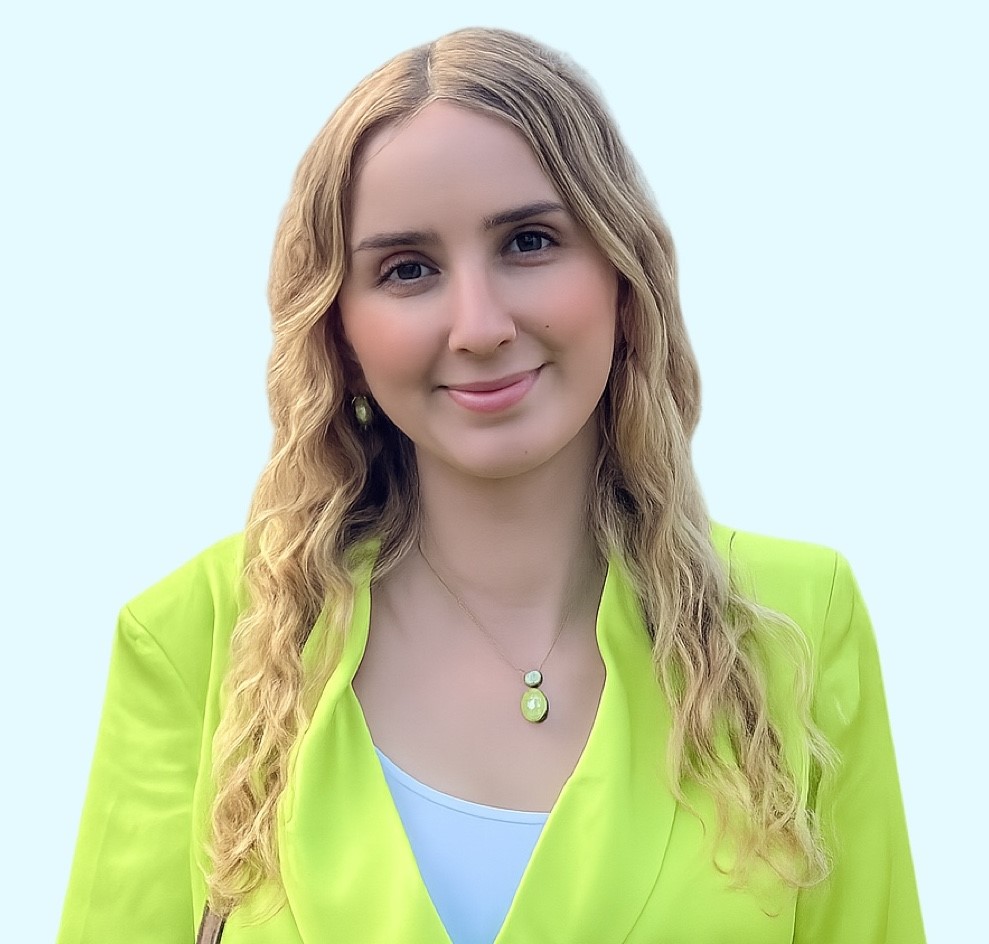
Joana Cerqueira
PhD Student, Doctoral Program in Biomedical Engineering, FEUP
MyKneeRecovery – Precision Monitoring for Better Rehabilitation
MyKneeRecovery is an innovative system that helps to monitor a patient’s knee recovery after surgery by providing accurate, real-time data on movement and muscle activity. It includes wearable sensor-embedded stockings equipped with motion sensors (IMUs), temperature sensors, and EMG sensors that track how the knee is moving and how the muscles are working during rehabilitation exercises. The system also features a 3D thermal imaging tool that captures the shape and temperature of the knee to assess inflammation and healing. All this information is sent to a mobile app, where patients and clinicians can easily view progress, detect problems early, and adjust recovery plans as needed. Unlike traditional systems, MyKneeRecovery is portable, affordable, and easy to use at home or in a clinic, making recovery monitoring more objective and available to more people.
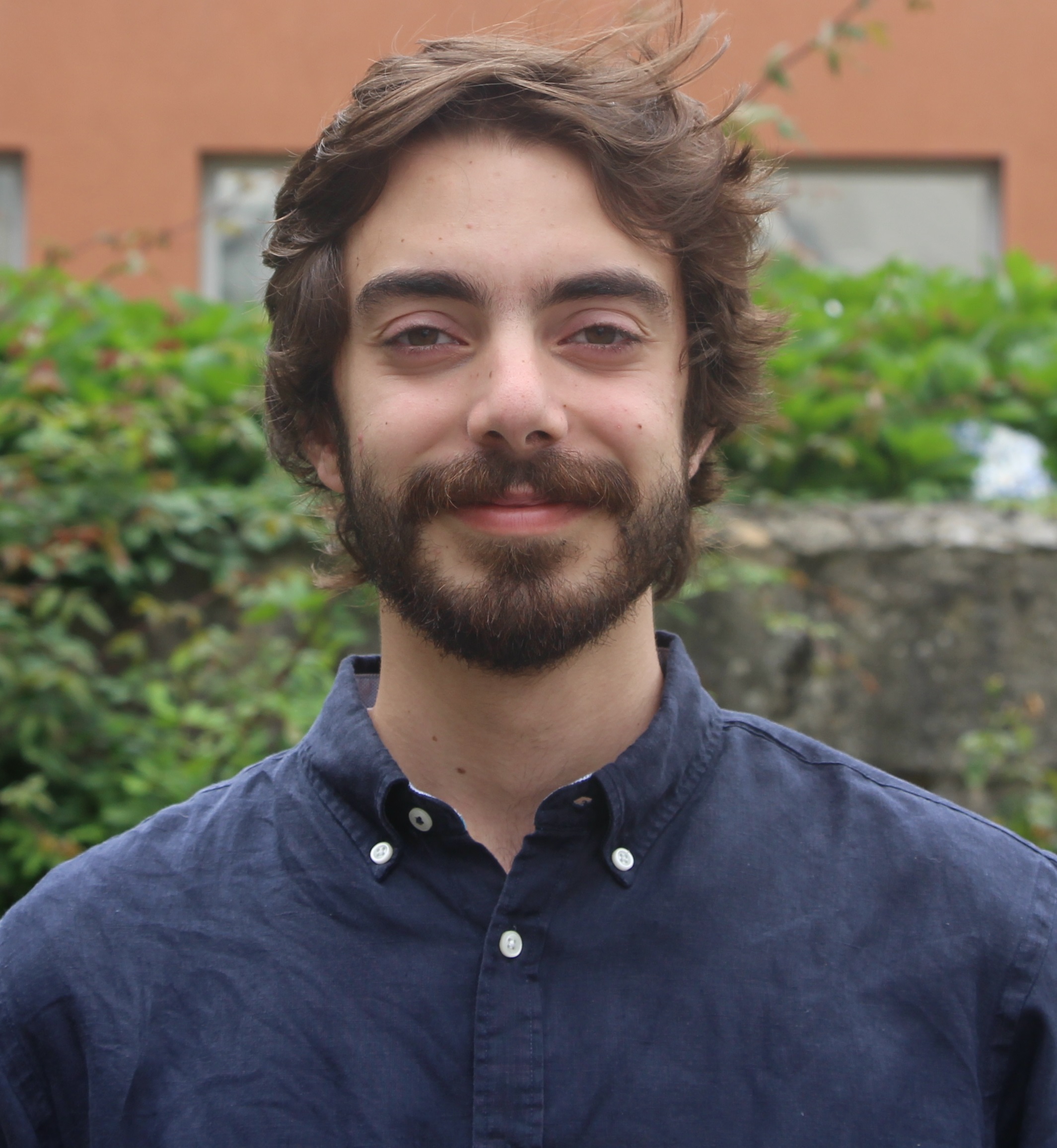
Manuel Fernandes
PhD Student, Doctoral Program in Electrical and Computer Engineering, FEUP
UPWIND – Portable, Clean and Affordable Electrical Energy for All
UPWIND is developing a portable wind-powered generator based on Airborne Wind Energy (AWE) technology. The core of the technology is a fixed-wing drone (resembling a kite) that is tethered to a ground station by a cable. This cable winds around a rotating drum connected to an electric generator. As the drone flies at high altitudes (200-300m) where winds are stronger and more consistent, it harnesses wind energy, causing the cable to unwind and turn the drum, thus generating electricity. Once the cable fully extends, the generator retracts it, and the cycle repeats. A key innovation of UPWIND is its unique automatic Circular Take-Off and Landing (CTOL) system, which allows for fully autonomous operation without sacrificing efficiency.

Ana Teixeira
PhD Student, Doctoral Program in Informatics Engineering, FEUP
BodyBoost – Stop Injuries Before They Stop You
BodyBoost is a discreet, smart wearable worn on the lower back that continuously monitors posture and movement throughout the day. It quietly detects when someone starts falling into poor postural habits and responds instantly with a gentle vibration, just enough to prompt a quick, natural correction without interrupting their work. What sets BodyBoost apart is how it turns these moments into meaningful insights. Workers can track their own progress through a simple mobile app, helping them build better habits over time. At the same time, employers can access anonymised team-level data that highlights broader trends and risks, allowing for safer work environments without compromising individual privacy. Designed to be practical for everyday use, BodyBoost fits seamlessly into any routine, offering real-time support and long-term improvement, without adding complexity.
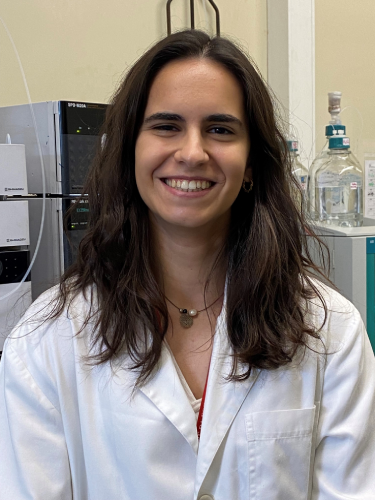
Rita Barros
PhD Student, Doctoral Program in Chemical and Biological Engineering, FEUP
Triple-Action Cutaneous Device for Skin Cancer Treatment
The proposed technology is a skin patch designed to treat skin cancer in a targeted and non-invasive way. It works like a glucose monitor, but instead of tracking blood sugar levels, it triggers photo and biocatalytic reactions that can harm the tumour cells when exposed to light. The patch is composed of three main components:
- Graphitic Carbon Nitride (GCN): A metal-free semiconductor activated by visible light that can generate toxic radicals to kill cancer cells.
- Glucose Oxidase (GOx): An enzyme that consumes glucose from the tumour microenvironment, starving the cancer cells of essential nutrients and producing hydrogen peroxide as a by-product.
- Haemoglobin (Hb): An iron-containing protein found in red blood cells that helps convert hydrogen peroxide into highly reactive species (through Fenton reactions) that can destroy cancer cells.
When the patch is applied to the skin and exposed to light, it simultaneously activates three powerful therapies, all at once: Photodynamic Therapy (PDT), Chemodynamic Therapy (CDT) and Starvation Therapy (ST). These therapies deliver precise, effective, and localised cancer treatment with minimal harm to healthy tissue.
